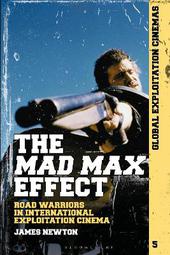
|
The Mad Max Effect: Road Warriors in International Exploitation Cinema
Hardback
Main Details
| Title |
The Mad Max Effect: Road Warriors in International Exploitation Cinema
|
| Authors and Contributors |
By (author) Dr James Newton
|
| Series | Global Exploitation Cinemas |
|---|
| Physical Properties |
| Format:Hardback | | Pages:224 | | Dimensions(mm): Height 229,Width 152 |
|
| Category/Genre | Film theory and criticism |
|---|
| ISBN/Barcode |
9781501342295
|
| Classifications | Dewey:791.4375 |
|---|
| Audience | | Tertiary Education (US: College) | |
|---|
| Illustrations |
18 bw illus
|
|
Publishing Details |
| Publisher |
Bloomsbury Publishing Plc
|
| Imprint |
Bloomsbury Academic USA
|
| Publication Date |
1 July 2021 |
| Publication Country |
United States
|
Description
The Mad Max Effect provides an in-depth analysis of the Mad Max series, and how it began as an inventive concoction of a number of influences from a range of exploitation genres (including the biker movie, the revenge film, and the car chase cinema of the 1970s), to eventually inspiring a fresh cycle of international low budget 'road warrior' movies that appeared on home video in the 1980s. The Mad Max Effect is the first detailed academic study of the most famous and celebrated post-apocalypse film series, and examines how a humble Australian action movie came from the cultural margins of exploitation cinema to have a profound impact on the broader media landscape.
Author Biography
James Newton is Lecturer in Media Studies and Film at the University of Kent, UK. He is the author of The Anarchist Cinema (2019) and a filmmaker. He also runs the Newton Talks podcast.
ReviewsThe Mad Max Effect stands as an engaging exploration of perhaps the most (in)famous post-apocalyptic action film series and its enduring legacy and influence. Detailing the wider impact of the initial film series, the book addresses examples of international 'MadMaxploitation' cinema, 21st century Road Warrior fan productions and the enduring aesthetic influence of 'Diesel Punk' in contemporary media. Newton is able to navigate the tarnished steel, burnt out tyres and ignited engine oil to examine the broader contexts of national cinema and cultural identity, transnational cinematic flows, and developments in screen media technology (all of which are central to the ongoing study of global exploitation cinema). * Thomas Joseph Watson, Lecturer in Media Studies, Teesside University, UK *
|